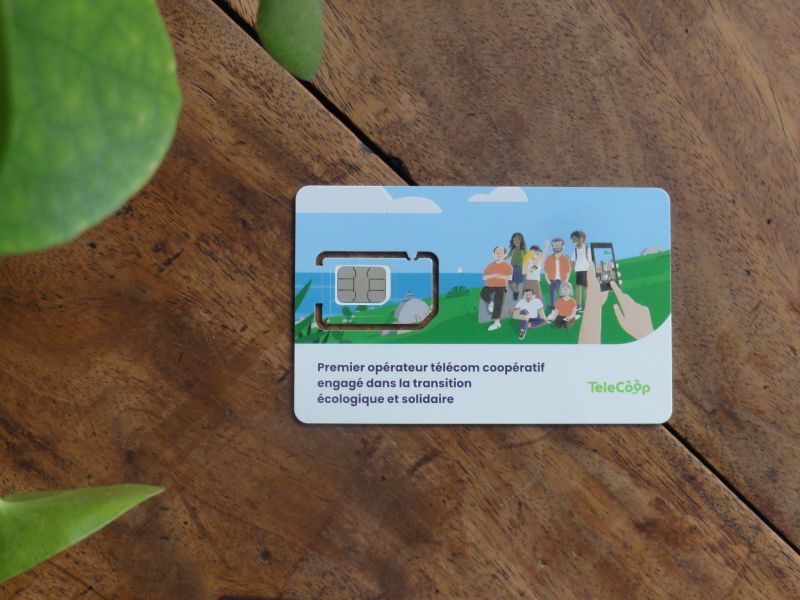
France’s first telecoms cooperative, TeleCoop, was set up by a group of French citizens who wanted to offer consumers a values-driven alternative.
The project was inspired by similar initiatives in other countries such as the Phone Co-op in the UK, Som Connexió in Spain and Neibo in Belgium.
“It was happening everywhere but not in France. This created a motivation to say, okay, we can do it. That's important because it gave us the confidence that it was possible, especially in the telecoms sector, which is very competitive and difficult to enter,” said Pierre Paquot, one of the founding members who came up with the idea for a telecoms cooperative while working for EnerCoop, the largest renewable energy cooperative in France.

“People want more transparency, they want to be involved, and they want companies that share the profits differently,” he added. Bringing TeleCoop to life took around 12 months. The cooperative launched its mobile offer in 2020 with plans to provide broadband services by 2022.
While cooperatives may sometimes not have access to all of the same financing tools available to other start-up enterprises, their competitive advantage comes from being part of a larger cooperative community. In the case of TeleCoop, having cooperators with experience willing to help and take the time to support the project was crucial to the success of the venture.
TeleCoop has grown to include 400 members and almost 2,000 customers - helped by principle 6, cooperation amongst cooperatives. It has joined several cooperative networks to promote the model to consumers.
“Being a cooperative gives us a competitive advantage, because there are a few big players and many smaller players,” added Mr Paquot “We don’t compare ourselves necessarily to the big players but newcomers, the smaller players.
“It's how you interact with your provider and how your provider interacts with the consumer that makes the difference. So there's a very human aspect and connection relationship aspect in that industry. You don't see megabytes, you don't see electrons, but what you see is the face of the people. That's why it's a big competitive advantage, that we represent some values that are very new in the telecom industry.”
TeleCoop forms part of a collective called Licoornes, made up entirely of cooperatives, which provide various services, from online retail and power generation, to ethical finance and car sharing. Licornes means unicorns, but it is spelt with two “Os” to showcase the “cooperative” difference.
“We don't think we can change the world alone. So we need to do it with other cooperatives that share our values and also raise the profile of cooperatives among consumers, letting them know that there is an alternative, that is credible, strong, open, and not in silos. We want to break the silos,” he explained.
As to the future, TeleCoop hopes to grow its consumer base to tens of thousands to achieve an economy of scale and develop new services for the more sustainable, digital users. The cooperative also plans to open an online store providing sustainable alternatives such as the Fairphone, and will encourage people to repair, rather than replace, devices.
TeleCoop is also a founding member of FairTEC, a collective of European companies working together to create and offer sustainable and ethical integrated smartphone solutions.
“It's a growing movement. All of this is happening, and it's now,” added Mr Paquot.
Vivian Woodell, founder of The Phone Co-op who now heads the Phone Co-op Foundation for Co-operative Innovation, worked with the evolving group of people who were looking to start a telecoms co-op in France over quite a few years, starting when he was working at The Phone Co-op, and this engagement has continued as part of the work of the Foundation. He worked closely with TeleCoop, sharing his experience in the sector.
“I'm delighted that they managed to launch TeleCoop during the pandemic,” he said, adding that entering the market can be challenging but TeleCoop has so far shown impressive growth.
“It's more important to focus on where strengths are, which is the relationship with customers, the different quality of that relationship which comes from being owned by them, and being a cooperative. And you can use your market power as a buyer to influence the upstream providers without owning the infrastructure yourself.
“The telecoms industry is well known for confusing pricing which lacks transparency. This is where a co-op can make a real difference by having more straightforward, honest pricing that customers can understand,” says Mr Woodell. The Phone Coop was also among the pioneers of the Fair Tax Mark, which certifies businesses who pay the right amount of tax, at the right place, at the right time.
In terms of what the future might bring to the industry, Mr Woodell thinks more cooperatives could be set up in countries where there is a favourable environment. “I do think there is scope in telecoms and in utilities generally for cooperatives to play a role,” he says, adding that the market will continue to change as technology evolves.
“It is very exciting to start new, mass market consumer co-operatives in an industry that used to be state controlled, and where private operators have not always had a good reputation. This is a chance for cooperatives to demonstrate how they are a different, better model. I think this is applicable in many countries.
“Some countries present more opportunity than others – quite a lot is down to regulation. So, you have to find the right place to do it.”




